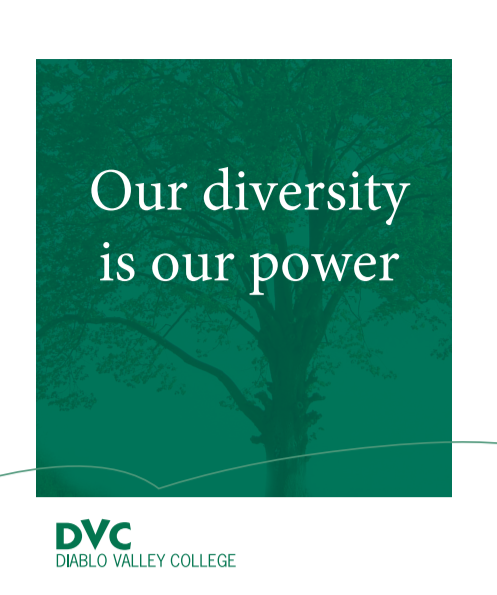Racial Justice Tools and Resources
This page is designed to house resources that support faculty and staff, and our community at large, to be more culturally responsive and to improve our practice as educators. The page emerged as a recommendation out of the Spring 2019 Racial Justice Task Force, and we will continue to build it over this academic year.
Transforming White Privilege (TWP) curriculum materials
The TWP curriculum is designed to help current and emerging leaders from a variety of sectors better identify, talk about and intervene to address white privilege and its consequences. The curriculum includes lessons plans, handouts, PowerPoint slides and video clips covering a number of key concepts, tools and strategies for change.
Access the Transforming White Privilege curriculum
DVC has institutional access to the TWP curriculum and materials. Please use the log in and password below.
To log in:
- Scroll to the bottom of the page
- Username: rrobison@dvc.edu
- Password: @Diablo
USC Race and Equity Center
Diablo Valley College, along with 60 other community colleges, has joined the Alliance. Access their Racial Equity Tools.
The Alliance will use the following approach for member institutions:
- Professional learning: Beginning in June 2020, the Center will annually host a dozen eConvenings, each on a particular aspect of racial equity. These high-quality professional learning experiences for high-level administrators and faculty leaders will be held virtually throughout the year, one per month. Each eConvening will explore strategies and practical approaches for equity issues.
- Virtual racial equity resource portal: The Center is developing an online repository of resources and tools for Alliance member colleges. Downloadable equity-related rubrics, readings, case studies, videos, slide decks, and conversation scripts will be included in the portal and accessible to all employees at member colleges.
- Campus climate surveys: Using the National Assessment of Collegiate Campus Climates (NACCC) as a model, the students, faculty and staff of each member institution will be surveyed about their feelings of belonging and inclusion, encounters with racism on campus, the frequency and depth of cross-cultural interactions, appraisals of institutional commitment to diversity and inclusion, and other related topics.
Equity Institutes: DVC has also partnered with USC’s Race and Equity Center for four (4) Equity Institutes. The USC Equity Institutes aim to bridge a specific gap: professionals often ascend to leadership roles in higher education without having had a proper course of study on how to effectively address persistent and pervasive racial problems, how to responsibly act in periods of racial crisis, or how to achieve racial equity.
Starting in fall 2020, each Institute is designed for teams of 20 administrators and faculty members on a single college or university campus, intended to increase individual competencies and organizational effectiveness to enhance equity, diversity, and inclusion.
Re-railing the conversation on race
In conversations about oppression, race, and racism, you are likely to encounter many derailing tactics. “Derailing” is the attempt to distract from the original trajectory of a difficult conversation. A person who is attempting to derail a conversation is usually doing so in order to interrupt a sense of internal discomfort they are experiencing, whether or not they are aware of it. Having multiple re-railing tactics at your disposal means that you can chose the re-railing tactic you wish to use based on your sense of what feels safe and manageable for you in that moment.
Learn tools and strategies to help “re-rail” the conversation
What is oppression?
Individual attitudes and actions along with historical, social and institutional power can result in racism, sexism and classism.
Making your class and syllabus more equitable
Learn five simple things you can do to make your syllabi and your classes more inclusive, welcoming, and equitable.

Please check back for updated resources and for how to contribute.

